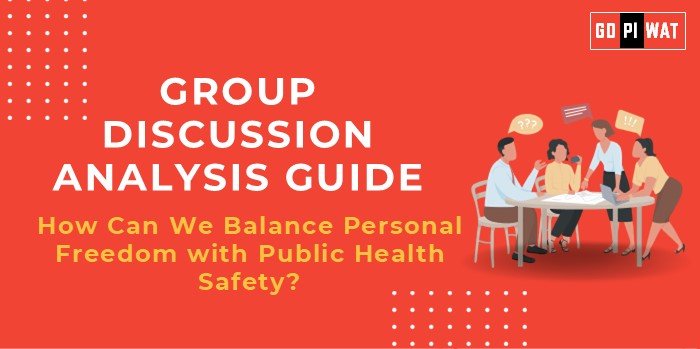📋 Group Discussion Analysis Guide: How Can We Balance Personal Freedom with Public Health Safety?
🌐 Introduction to the Topic
Opening Context: The balance between personal freedom and public health safety is a recurring ethical dilemma, especially highlighted during global health crises like the COVID-19 pandemic. Striking a harmony between individual rights and the collective good remains a cornerstone of modern public health policy.
Topic Background: This debate has historical roots in the management of pandemics and communicable diseases. Measures such as quarantine, vaccination mandates, and mask requirements have often stirred discourse on where individual liberties end and communal responsibilities begin. Modern technology and social dynamics further complicate this equation.
📊 Quick Facts and Key Statistics
- 💉 Global Vaccine Uptake: 70% of the world’s population has received at least one dose of a COVID-19 vaccine (2024).
- 🧠 Mental Health Impact: Lockdowns led to a 25% increase in anxiety and depression globally (WHO).
- 😷 Mask Compliance Rates: Compliance varied widely, from 95% in countries like Japan to under 50% in the U.S. during peak COVID waves.
- 💸 Economic Cost of Public Health Crises: The global economic loss from COVID-19 is estimated at $12.5 trillion over five years (IMF).
👥 Stakeholders and Their Roles
- 🏛️ Governments: Develop policies and enforce public health measures.
- 🩺 Healthcare Systems: Deliver medical interventions and manage outbreaks.
- 👥 Private Citizens: Uphold public health measures while advocating for personal rights.
- 🌍 International Organizations: Facilitate global cooperation (e.g., WHO, UN).
🏆 Achievements and Challenges
Achievements:
- 💉 Vaccination Campaigns: Mass immunization programs reduced COVID-19 mortality rates by 70%.
- 🤝 Global Collaboration: Initiatives like COVAX ensured vaccine equity for 142 countries.
- 📱 Technology in Tracking: Contact tracing apps (e.g., Aarogya Setu in India) helped monitor outbreaks.
Challenges:
- 🚫 Resistance to Measures: Mask and vaccine mandates faced significant opposition in some nations.
- 🌍 Economic Inequities: Poorer nations struggled to access timely vaccines.
- 🔐 Privacy Concerns: Digital tracking sparked debates on surveillance overreach.
🌏 Global Comparisons:
- 🇳🇿 New Zealand: Effective balance via early lockdowns and transparent communication.
- 🇸🇪 Sweden: Minimal restrictions prioritized freedom but faced higher mortality.
📖 Case Studies:
India’s COVID Lockdown: Drastically reduced transmission but disrupted livelihoods, highlighting the trade-offs involved.
📚 Structured Arguments for Discussion
- ✅ Supporting Stance: “Mandatory public health measures, such as vaccinations, are crucial to protecting vulnerable populations and maintaining societal stability.”
- ❌ Opposing Stance: “Enforcing mandates infringes on personal liberties and often leads to public mistrust and resistance.”
- ⚖️ Balanced Perspective: “While public health safety is paramount, measures must be inclusive, transparent, and respect individual rights to ensure compliance.”
🎯 Effective Discussion Approaches
- 💡 Opening Approaches:
- “The global vaccine rollout saved millions of lives but reignited debates about individual freedoms.”
- “Can we achieve collective safety without compromising personal freedom?”
- “New Zealand’s early interventions demonstrate the impact of prioritizing health over freedom.”
- 🛠️ Counter-Argument Handling:
- Acknowledge concerns (e.g., economic losses).
- Provide data-backed solutions (e.g., targeted lockdowns).
- Cite global successes for balanced context.
🔍 Strategic Analysis of Strengths and Weaknesses
Strengths:
- 📜 Clear legal frameworks for emergencies.
- 📡 Public health technology advancements.
Weaknesses:
- 🚫 Resistance to centralized policies.
- 🌍 Limited resources in low-income countries.
Opportunities:
- 🤖 Leveraging AI for better crisis management.
- 📚 Educating the public on health literacy.
Threats:
- ⚠️ Rising mistrust in public institutions.
- 📉 Political polarization of health measures.
🎓 Connecting with B-School Applications
- 🌟 Real-World Applications: Designing pandemic response strategies in operations or policy courses; researching the economic impacts of health crises.
- ❓ Sample Interview Questions:
- “How should policymakers balance ethics with efficiency in public health?”
- “Discuss a global example where public health safety triumphed over individual freedoms.”
- 📘 Insights for B-School Students: Use data-driven decision-making to address ethical dilemmas; explore international health economics for internships or projects.


